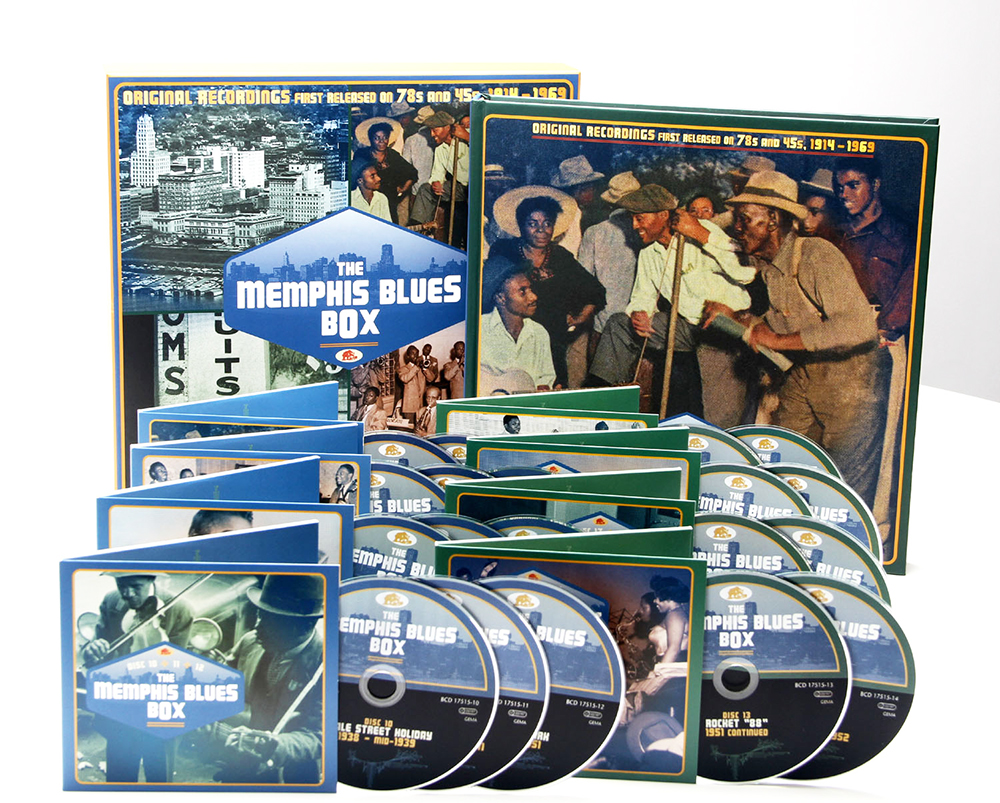Many have spoken of a “Memphis sound” that permeates the playing of musicians who grew up here, yet the particulars of that sound can be elusive. That’s especially true if one takes the long view of over a half century, as does the latest release from Bear Family Records, The Memphis Blues Box: Original Recordings 1914–1969. And yet that title alone, and the span of its purview, connotes one common thread through Memphis music: the blues itself.
As David Evans says of his contribution to the box set’s liner notes, “I tried to address that in my essay, which looks at urban and regional blues and whether there was any particular sound to it. By and large, you get a lot of variety. So it’s pretty hard to characterize urban blues. I’d be reluctant to go too far in that direction, trying to characterize a Memphis sound. But in a broader sense the blues itself and blues techniques permeate an awful lot of Memphis popular music.”
That said, listeners should buckle up for a wild ride through history as Bear Family, known for its thorough, completist collections, takes a tour through “Memphis blues as defined by the performers and their record companies during the years 1914 to 1969,” as the set’s promotional material says. Significantly, that was the period when blues was issued primarily on singles (78 RPM records and later 45s), and the box includes at least one side of every blues record made in Memphis by Memphis-area musicians in that period. But there are also many sides cut elsewhere by artists whose grasp of the blues took them to studios far and wide. Aside from the blues, the key common thread is that, as with Harry Smith’s 1952 Anthology of American Folk Music, all of these tracks were commercially released at one time.
That doesn’t make them any more rare or surprising. There was a lot of music to choose from. With 20 CDs, 534 tracks, and an accompanying 360-page book, the set starts over 100 years ago with W.C. Handy’s tune “Memphis Blues,” then moves through classic blues, jug band blues, itinerant blues from the 1920s and ’30s, the R&B bands and small combos of the 1940s and ’50s, and the tougher blues styles recorded up until the close of the 1960s. And even within those stylistic movements, there’s considerable variation. It’s a testament to how diverse the blues can be.
Take track 10 on the first disc, “I Raised My Window and Looked at the Risin’ Sun,” by Ollie Rupert, released by Victor Records in 1927. What could have been a typical guitar-driven blues takes on an eerie quality through its use of the jaw harp, with its strangely atonal harmonics adding a uniquely alien sound to the small combo’s sound. Blues from Mars, perhaps? As Evans notes, “That’s an interesting one. It might be the only commercial recording of that instrument in a blues setting. It’s a little chaotic, musically, and Ollie Rupert was obviously kind of an amateur performer, with that voice. I’m glad it was issued, though.”
More familiar names abound as well, including Furry Lewis, Memphis Minnie, Elvis Presley, and even Booker T. Jones, but sometimes it’s the names behind the stars that are most striking. Many Stax fans know that drummer Al Jackson Jr.’s father was a bandleader, but now you can hear the actual sides Al Jackson Sr.’s jump band cut. Here too are sides cut by pianist Phineas Newborn’s father and “the Phineas Newborn Orchestra.” And two local music dynasties are evoked with The Jesters’ stomping version of “My Babe” on disc 20, featuring both Sam Phillips’ son Jerry on guitar and Jim Dickinson on piano and vocals.
Thus, a good deal of fine-grained, detailed history resides in this music, and the book alone is a monumental work of scholarship. Introduced by Charlie Musselwhite, the book offers biographies of every performer (many newly researched), notes on each recording, and many unseen photographs. The project was produced and part-written by historian Martin Hawkins, but the book also includes important essays by other experts on various aspects of the Memphis blues, including local scholars like Evans, Richard Raichelson, and Tyler Fritts.
